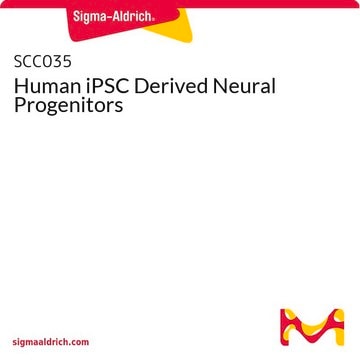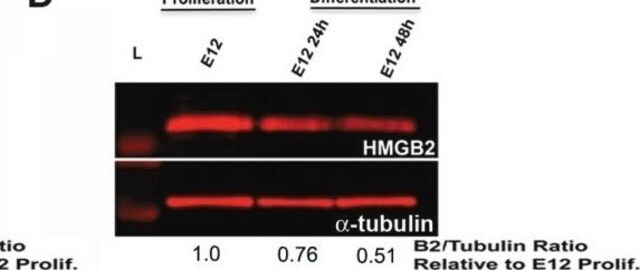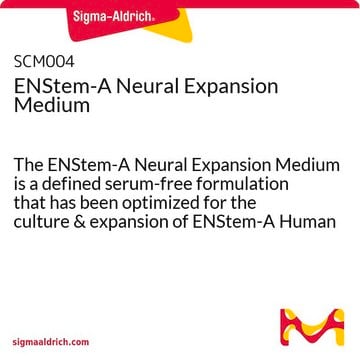SCC007
ReNcell CX Human Neural Progenitor Cell Line
ReNcell CX is an immortalized human neural progenitor cell line with the ability to readily differentiate into neurons & glial cells.
Synonym(s):
Human NSC Line, Human Neural Stem Cell Line, Human Neural Stem Cells
Sign Into View Organizational & Contract Pricing
All Photos(1)
About This Item
UNSPSC Code:
41106509
eCl@ss:
32011203
NACRES:
NA.75
Recommended Products
biological source
human
Quality Level
manufacturer/tradename
Chemicon®
ReNcell
technique(s)
cell culture | stem cell: suitable
input
sample type neural stem cell(s)
shipped in
liquid nitrogen
General description
Product Source: Human cortical brain tissue
ReNcell CX is an immortalized human neural progenitor cell line with the ability to readily differentiate into neurons and glial cells. ReNcell CX was derived from the cortical region of human fetal brain. Immortalized by retroviral transduction with the c-myc oncogene, this cell line grows rapidly as a monolayer on laminin with a doubling time of 20-30 hours. Karyotype analyses indicate that the ReNcell CX retains a normal diploid karyotype in culture even after prolonged passage (>45 passages). ReNcell CX was developed by the ReNeuron Group plc, a biotech company that specializes in using human somatic stem cells for therapeutics. ReNcell CX may be used for a variety of research applications such as studies of neurotoxicity, neurogenesis, electrophysiology, neurotransmitter and receptor functions. ReNcell CX cells have been obtained in a legal and ethical manner, compliant with current local informed consent procedures.
ReNcell Now Used in a 3D Cell Model of Alzheimer′s Disease!
Tanzi, R and Kim, DY et. al. A three-dimensional human neural cell culture model of Alzheimer′s disease. Nature. 2014 Nov 13;515(7526):274-8.
(Published in Nature)
ReNcell Now Used in a 3D Cell Model of Alzheimer′s Disease!
Tanzi, R and Kim, DY et. al. A three-dimensional human neural cell culture model of Alzheimer′s disease. Nature. 2014 Nov 13;515(7526):274-8.
(Published in Nature)
Cell Line Description
Neural Stem Cells
Application
Research Category
Stem Cell Research
Stem Cell Research
Components
> 1x106 viable ReNcell CX cells
Quality
Each lot of ReNcell CX cells has been validated for high level of expression of Nestin and Sox 2 and for their self-renewal and multi-lineage differentiation capacities (please refer to datasheet figures). Cells also display normal karyotype as assessed by chromosome spread and tested negative for mycoplasma. Maternal blood has been screened for HIV, HTLV, Hepatitis B and C.
Storage and Stability
When stored at the recommended storage conditions (liquid nitrogen), ReNcell CX cells are stable up to the expiration date. Do not expose to elevated temperatures. Discard any remaining reagents after the expiration date. We recommend that the cells be used within ten passages.
Other Notes
This product is intended for sale and sold solely to academic institutions for internal academic research use per the terms of the "Academic Use Agreement" as detailed in the product documentation. For information regarding any other use, please contact licensing@emdmillipore.com.
Legal Information
CHEMICON is a registered trademark of Merck KGaA, Darmstadt, Germany
Disclaimer
RESEARCH USE ONLY. This product is regulated in France when intended to be used for scientific purposes, including for import and export activities (Article L 1211-1 paragraph 2 of the Public Health Code). The purchaser (i.e. enduser) is required to obtain an import authorization from the France Ministry of Research referred in the Article L1245-5-1 II. of Public Health Code. By ordering this product, you are confirming that you have obtained the proper import authorization.
Storage Class Code
12 - Non Combustible Liquids
WGK
WGK 3
Flash Point(F)
does not flash
Flash Point(C)
does not flash
Certificates of Analysis (COA)
Search for Certificates of Analysis (COA) by entering the products Lot/Batch Number. Lot and Batch Numbers can be found on a product’s label following the words ‘Lot’ or ‘Batch’.
Already Own This Product?
Find documentation for the products that you have recently purchased in the Document Library.
Customers Also Viewed
Mia C Borlongan et al.
Neuromolecular medicine, 23(4), 540-548 (2021-04-09)
The present in vitro study showed that IL-2/IL-2R antibody complex facilitates Treg-induced neuroprotection in the oxygen glucose deprivation/reoxygenation (OGD/R) model of stroke. First, we examined the role of IL-2/IL-2R-treated Tregs in OGD/R-exposed rat primary cortical cells (PCCs), which represent the
Greg Maguire et al.
Physiological reports, 7(9), e14072-e14072 (2019-05-03)
Evidence suggests that adult stem cell types and progenitor cells act collectively in a given tissue to maintain and heal organs, such as muscle, through a release of a multitude of molecules packaged into exosomes from the different cell types.
Liang Luo et al.
Scientific reports, 7, 40463-40463 (2017-01-12)
There has been recently been increased interest in the plasticity of human umbilical cord mesenchymal stem cells (UMSCs) and their potential in the treatment of neurological disorders. In this study, UMSCs were transdifferentiated into neural stem-like cells (uNSCL), these cells
Suojun Zhang et al.
International journal of oncology, 45(5), 1989-1996 (2014-09-02)
Glioma stem cells (GSCs), characterized by self-renewal, multi-potentiality and tumorigenicity, are responsible for the tumor propagation, recurrence and resistance to traditional treatments, representing a critical therapeutic target. Neural stem cells (NSCs) possess inherent tropism to brain tumor cells and inhibit
Nathalia Barth de Oliveira et al.
Membranes, 11(9) (2021-09-27)
Adipose tissue-derived mesenchymal stem cells (ADMSCs) are promising candidates for regenerative medicine, as they have good cell yield and can differentiate into several cell lines. When induced to the neuronal differentiation, they form neurospheres composed of neural precursors (NPs) that
Our team of scientists has experience in all areas of research including Life Science, Material Science, Chemical Synthesis, Chromatography, Analytical and many others.
Contact Technical Service











